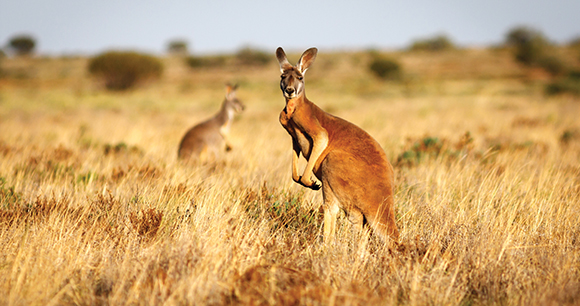Parliamentary Report Condemns Current Kangaroo Management
In October, Australia’s New South Wales (NSW) Parliament published a blistering report entitled Health and wellbeing of kangaroos and other macropods in New South Wales, taking to task the NSW government for serious issues regarding its management of kangaroos. The parliamentary inquiry was triggered by public concern over the annual slaughter of millions of kangaroos, including for export of their skins and meat to the United States and other countries. In 2020, in NSW alone, commercial hunters slaughtered over 2.1 million kangaroos and wallaroos (a figure that does not include an unknown number of animals killed for noncommercial purposes and of baby kangaroos—joeys—killed in the hunts).

Forty witnesses, including ecologists, aboriginal elders, kangaroo carers (rehabilitators), biostatisticians, government officials, and concerned citizens, as well as Mick Mcintyre and Kate Clere of Kangaroos Alive (an organization that has received support from AWI), provided compelling, often heart-wrenching testimony to the parliamentary committee established to lead the inquiry. The elders explained how aboriginal interests in kangaroos have been ignored by the state agency responsible for kangaroo management. Other witnesses challenged the accuracy of kangaroo population counts and abundance estimates or described the blatant cruelty inherent in kangaroo shooting, including to the joeys either killed or orphaned and left to die by the hunters.
The report contains nearly two dozen recommendations, which, if implemented, will improve kangaroo management in NSW. The recommendations include incorporating aboriginal concerns into management plans, examining the economic benefits of ecotourism, assessing the impacts of climate change and exclusion fencing on kangaroos, ensuring that NSW’s management plan complies with Australia’s biodiversity conservation and environmental protection laws, developing new methods to count and estimate population abundance, considering drought conditions when setting quotas, collecting and releasing data on joey deaths from commercial hunts, and improving program transparency and enforcement.
Program Terms: Terrestrial Wildlife
AWI Quarterly Terms: Quick Read
Related News
IUCN Reaffirms Long-Tailed Macaques’ Endangered Status Despite Industry Pressure
In Program: Terrestrial WildlifeThe International Union for Conservation of Nature (IUCN) today released an update to its Red List of Threatened Species. The update revealed that the long-tailed...
AWI Funds Research to Alleviate Human-Wildlife Conflicts, Animal Suffering
In Program: Terrestrial WildlifeThe Animal Welfare Institute (AWI) announced today the eight recipients of its Christine Stevens Wildlife Award who are developing humane solutions to human-wildlife conflicts and...
Refuge from Cruel Trapping Act Reintroduced to Protect Wildlife and Pets on Public Lands
In Program: Companion Animals, Terrestrial WildlifeThe Animal Welfare Institute (AWI) endorses the Refuge from Cruel Trapping Act, reintroduced today in the US House of Representatives by Rep. Jerrold Nadler (D-NY)....
Colorado Now Leads Country in Comprehensive Approach to Fighting Wildlife Trafficking
In Program: Terrestrial WildlifeToday, Colorado Gov. Jared Polis signed S.B. 25-168 into law to combat wildlife trafficking. The bipartisan legislation, which is unique among states for the number...